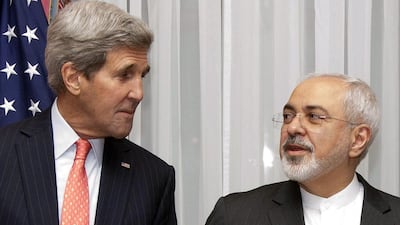There are many scenarios for which way Iran will go now that it has reached a framework deal with the P5+1 on its nuclear programme, Oraib Al Rantawi wrote in the Jordanian daily Addustour.
According to one scenario, Iran will cash in on the rapprochement with the West and expand the policy of “exporting the revolution” in the region. Other analysts think that Tehran would prefer to improve business links with the West to rejuvenate its sanctions-hobbled economy. A third strand says that it will take time for the dust of the factional wars to settle before a direction is set.
The Operation Decisive Storm coalition believes that the first scenario is most likely. The coalition fears that an Iranian nuclear bomb would have been the reason for a greater regional role but it is also worried that the deal will boost Iran’s economy and the by-product will be further regional expansionism.
This is why they stood against the nuclear programme and launched a war in Yemen to clip Tehran’s wings and achieve a better regional balance of power.
However, said Al Rantawi, the nuclear deal is more likely to strengthen those who support reform and moderation in the government and across Iranian society. This would move Tehran towards balanced and sensible international relations, cutting back on the “foreign threat” rhetoric and putting the focus instead on domestic issues including democracy, human rights and pluralism.
According to this scenario, history would see president Rouhani as a leader who played a role similar to Soviet president Mikhail Gorbachev when he adopted the glasnost and perestroika reforms.
In any event, Al Rantawi warned against expecting major change in the short term because Tehran will be busy expanding its business networks with the outside world.
The transition period is likely to be long because of a number of sectarian conflicts. Operation Decisive Storm has bolstered Iranian radicals and weakened the forces of reform and modernity.
Tehran is expected to use the fact that most terrorist groups are Sunni to seek support from the West in the fight against terror.
Wahid Abdulmajid argued in Al Ittihad, the sister newspaper of The National, that the nuclear deal reflects president Obama’s policy to engage, not confront. It began with Myanmar and Cuba but will reach new heights if the Iran deal is finalised.
The policy is based on the theory that giving Tehran the chance to engage with the international community will boost the forces of moderation there. But logical though that may sound, it will not come to pass easily, given Iran’s role in regional turmoil. This is likely to reinforce the hardliners, he argued, because of the way Iran’s political system is structured.
Another factor in Mr Obama’s plan is that any attempt at expansionism as a result of the deal will exhaust Iran’s capabilities and eventually the reform movement will become stronger.
But however logical that theory, he cautioned that there were other considerations. There has not been adequate and objective analysis about how overstretched Tehran has become through its expansionist policies and how the lifting of sanctions might affect that. This theory also disregards the rewards Tehran has won as a result of expansion into places like Iraq.
Abdelmoneim Saeed, writing in the London-based Asharq Al Awsat, said that although Tehran remains a revolutionary regime with regional ambitions, the Arab reaction to the nuclear deal has been exaggerated.
Iran has used a mixture of religion, sectarianism and aggression in Iraq, Syria, Lebanon and now Yemen. But to see the framework deal as support for Iranian policies and a prelude to an Iranian-American plot to reshape the region is way off base, he wrote. The deal does not give Iran licence to dominate because it has restricted Tehran’s ability to produce a nuclear weapon and Iran is not an economic giant and still faces huge challenges. Its GDP is $40 billion (Dh147bn) and per capita income is about $5,000. Eighty per cent of its economy depends on oil and gas exports and the distribution of power is uneven. Iran has exhausted itself through its revolution, fighting Iraq and by interfering in several Arab countries. Taken together, people will want to see a loosening of the regime’s grip on power.
aezzouitni@thenational.ae

